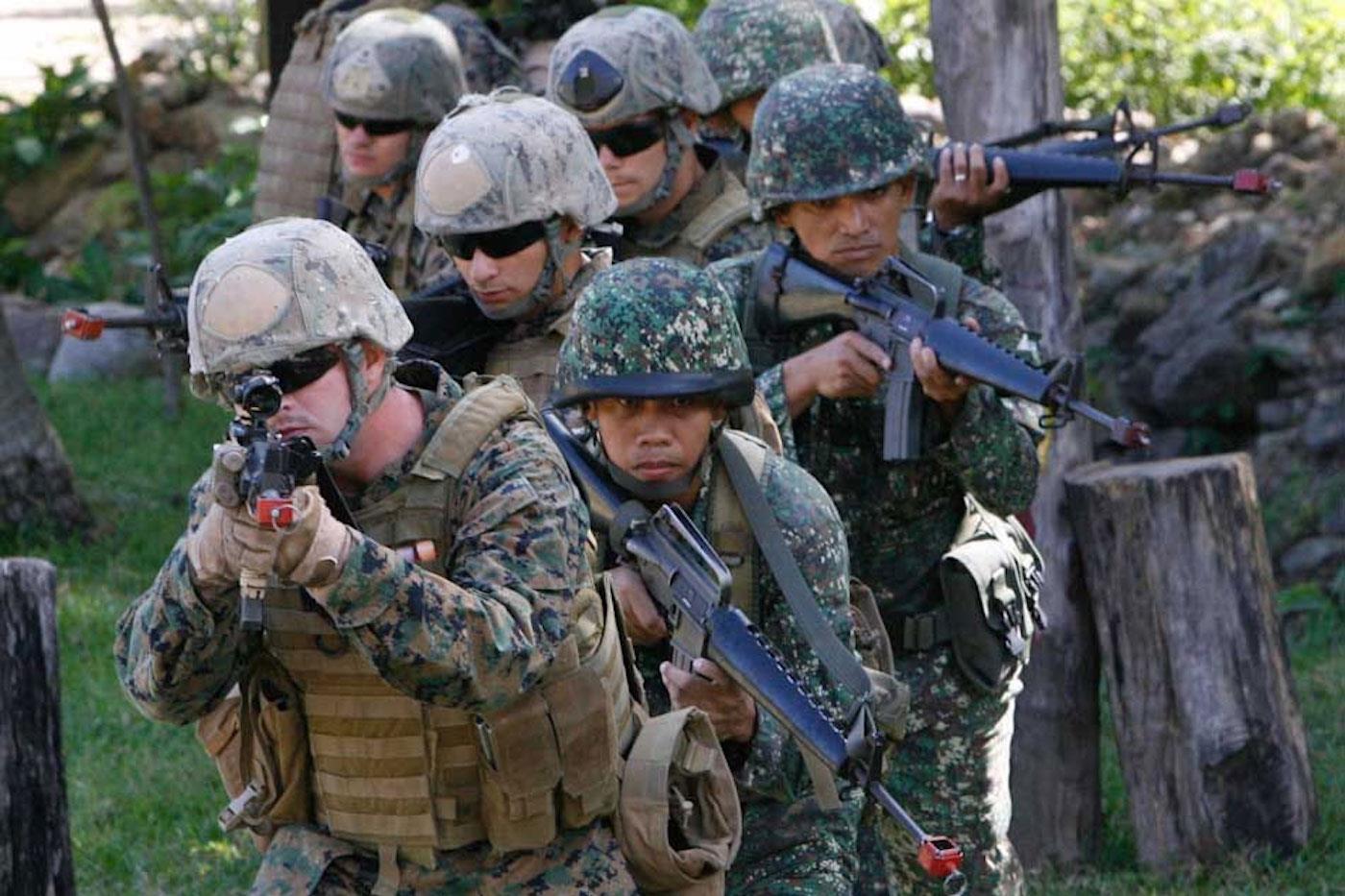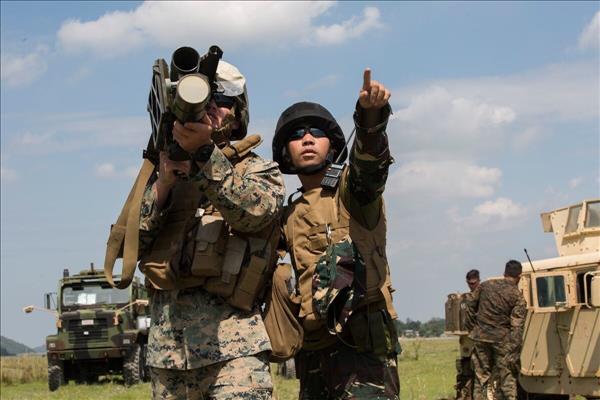(MENAFN- Asia Times) MANILA – Barely a month after granting the Pentagon extensive access to key Philippine bases under the Enhanced Defense Cooperation Agreement (EDCA), Manila kicked off major wargames with its sole treaty ally that promise to raise China's ire.
Earlier this week, the Philippines and the United States conducted their largest army exercises ever, with a special focus on fending off a potential full-scale invasion of the Southeast Asian island nation by a hostile power.
As many as 3,000 troops from the Philippine Army and the US Army Pacific took part in the Salaknib Exercise, first launched in 2014 and meaning“shield” in the northern Philippine language of Ilocano, in fort magsaysay in central luzon that had a particular emphasis on live-fire and artillery drills.
Philippine military authorities underscored the importance of the exercises due to the usage of“new tactics” to“face adversaries from out of the country”, drawing particularly on Ukraine's so far successful resistance to Russia's invasion based on the deployment of relatively limited, cutting-edge military technology.
For the first time, Tokyo has also sent observers to the high-profile exercises amid ongoing plans to establish a new tripartite Japan-Philippine-US (JAPHUS) alliance.
The Philippines also announced this week that it will conduct its largest-ever wargames with the US next month. The annual Balikatan (“shoulder-to-shoulder” in Filipino) exercises are expected to feature as many as 17,000 troops, almost twice as many as previous drills.
Crucially, the two sides will be conducting their first Patriot missile air-defense exercise, underscoring the growing focus on modern warfare interoperability between the allies.
Another drill will simulate the sinking of a hostile vessel 22 kilometers off Zambales, which is located just 100 nautical miles from the China-controlled Scarborough Shoal. China and the Philippines were locked in a months-long standoff over the feature in 2012 in which the US opted against intervening.

US and Philippine troops arm and arm in a joint military exercise. Photo: AFP
According to Balikatan spokesperson Colonel Michael Logico, the joint drill involving multi-domain coordination among air and naval forces will focus on“sinking a target vessel using a combination of artillery naval gunfire and aviation weapons” utilizing the High Mobility Artillery Rocket System (HIMARS) that has been used to devastating effect in Ukraine.
Former Philippine Navy vice-admiral Rommel Jude Ong characterized the exercises as primarily focused on“enhanc[ing] strategic deterrence posture of the Armed Forces of the Philippines” in the South China Sea.
Other Philippine military officials have characterized the massive wargames as a crucial step in enhancing the country's“maritime defense, coastal defense and maritime domain awareness.”
According to one senior Philippine military official who spoke on the condition of anonymity, the massive drills have an even more immediate crisis in mind.“It has a lot to do with Taiwan,” the AFP official said, emphasizing how the wargames were meant to enhance the country's“deterrence [capability], not provocation of China.”
Both Japan and Australia are also expected to participate in the exercises. Last month, Australian Defense Minister Richard Marles announced that his country would be sending its largest contingent yet to the Balikatan wargames. Both US allies would play key roles in any Taiwan contingency.
In recent months, the Philippines has emerged as America's new star ally in the region . In a major departure from his predecessor's pro-Beijing foreign policy, President Marcos Jr has doubled down on his country's defense relations with traditional allies, especially the US and Japan, in the past month.
Last week, US State Department Undersecretary for Political Affairs Victoria Nuland visited Manila to coordinate the implementation of EDCA, which faces growing opposition in the Philippines including from governors of frontier provinces close to Taiwan where military bases are situated.
US Ambassador to the Philippines MaryKay Carlson has publicly argued that the expanded American presence in the country won't provoke tensions with or retaliation from China.
“I don't see the EDSA sites as a magnet for that and, in fact, I see EDCA sites are a way for provincial authorities, local authorities to enhance their ability not only to defend themselves from a security perspective but to grow their economies,” the US top envoy said in an interview with the local GMA Network.
The policy pivot and scale and emphasis of the joint exercises, however, has triggered a hot debate at the highest levels in Manila, with former president Rodrigo Duterte and presidential sister Senator Maria Imelda“Imee” Marcos warning of unwanted escalation in regional tensions vis-à-vis China.

Chinese President Xi Jinping shows the way to then-Philippine president Rodrigo Duterte in a file photo. Photo: AFP
In a television interview last week, Duterte said“we are being made a platform for [American weapons]” and this would“make the Philippines vulnerable” to Chinese retaliation in the event of a conflict over Taiwan or in the South China Sea.
“It's going to be missiles coming in from the South China Sea or wherever from the land base facing the Philippines. Missiles will rain upon us. If it were up to me, I would have rather not [pressed ahead with the EDCA decision],” duterte added in a mixture of English and Filipino, underscoring the threat of an expanded US presence in bases close to Taiwan's shores.
Similarly, Senator Imee Marcos has warned that“If these EDCA sites are used as staging areas for US military intervention in Taiwan, then we may be dragged into [a potential Taiwan conflict].”
Buoyed by the high-profile opposition to expanded Philippine-US defense cooperation, the Chinese Embassy in Manila released a strongly-worded, if not colorful, statement warning against joining“US efforts to encircle and contain China.”
“To bundle the Philippines into the chariots of geopolitical strife will seriously harm Philippine national interests and endanger regional peace and stability,” the statement said.
Several senators, however, publicly backed the government's EDCA decision by emphasizing its largely defensive nature while criticizing China's behavior.
“If they want us to trust them, they have to respect our sovereignty and territorial integrity,” Senator JV Ejercito told the media.“They have already harassed a lot of our fishermen so many times. And now, they are doing it to our Coast Guard and Navy (personnel),” he added.
Similarly, Senator Francis Escudero called on Beijing to“look in the mirror” before accusing the US or the Philippines of raising regional tensions.
“Isn't what China [is] doing [in] Taiwan and the West Philippine Sea also 'undermining the stability of the region?' We have every right... to pursue a foreign policy that serves our national interest and should not be cowed by such threats,” he said in an interview.
Follow Richard Javad Heydarian on Twitter at @richeydarian


























Comments
No comment